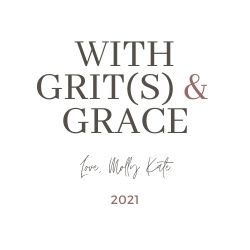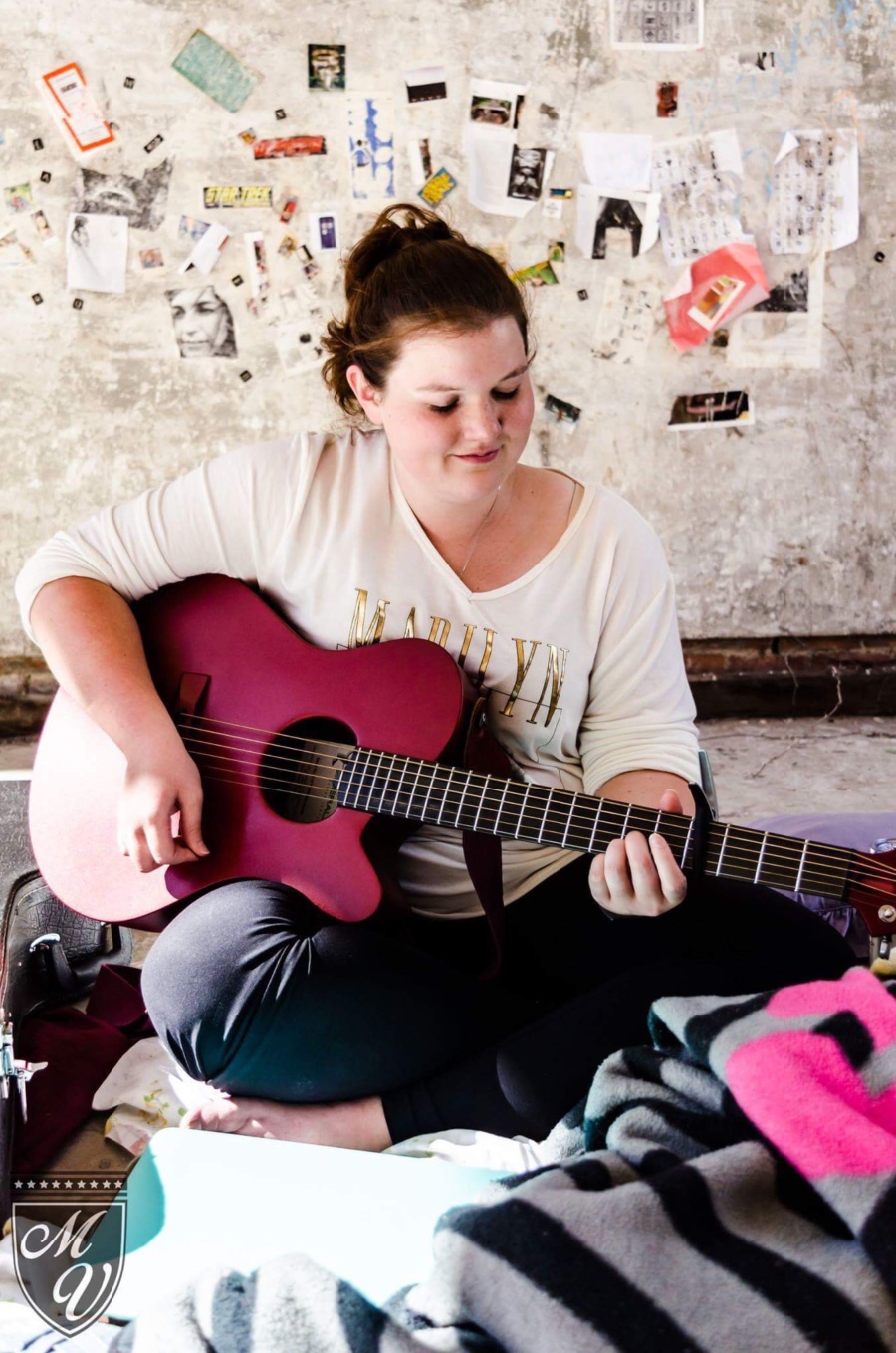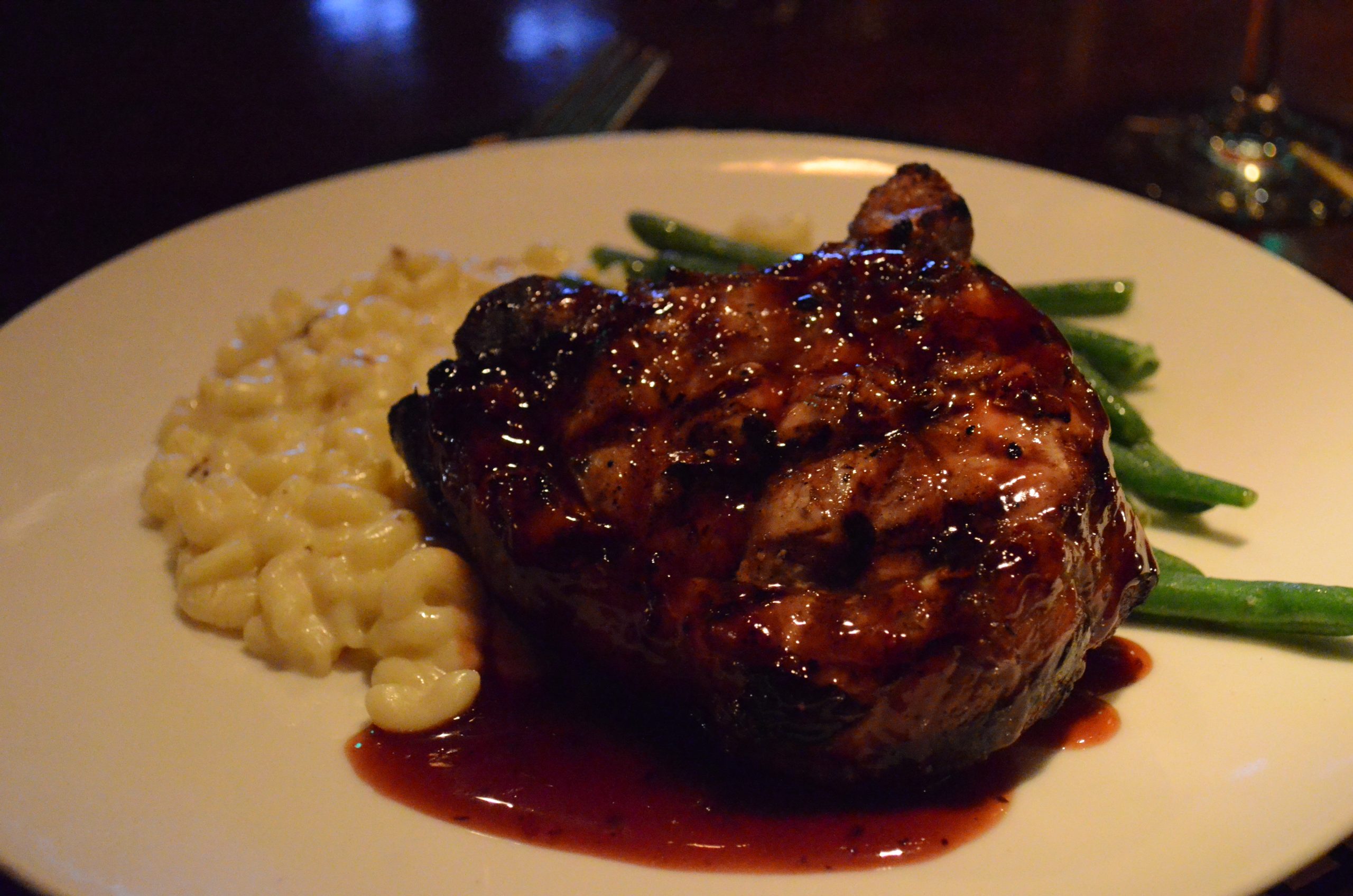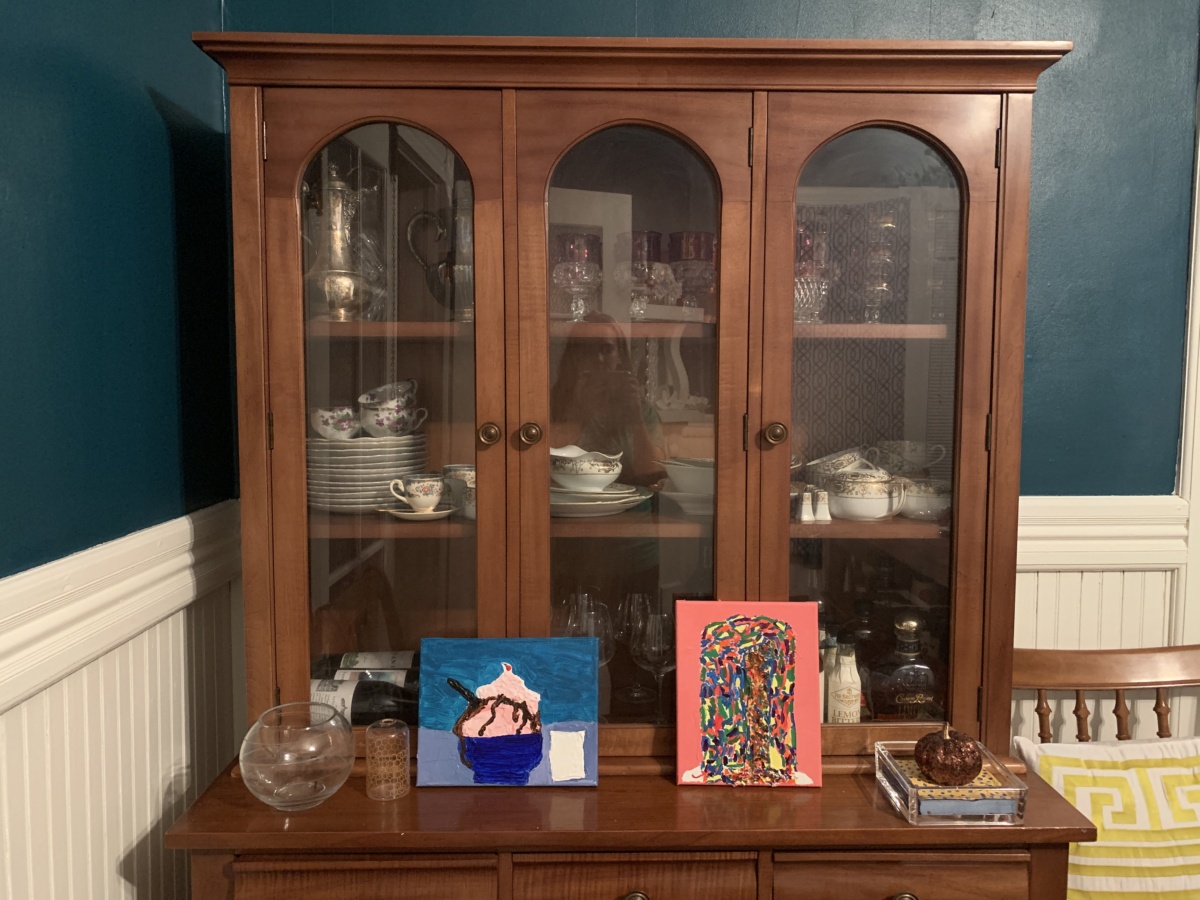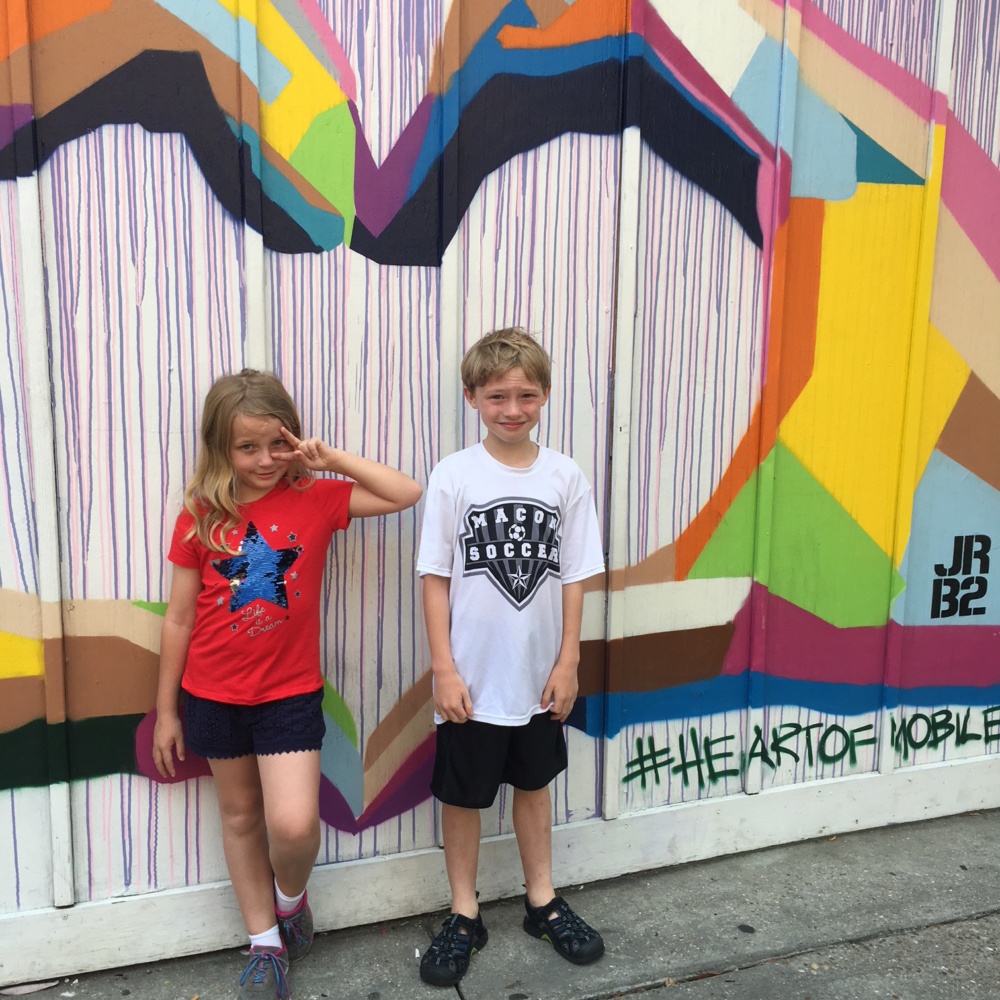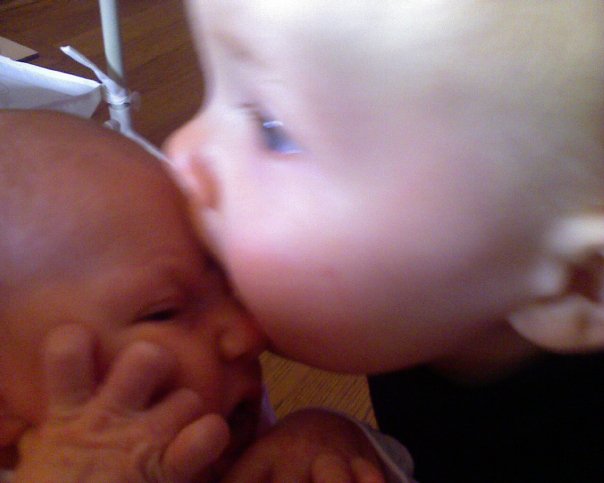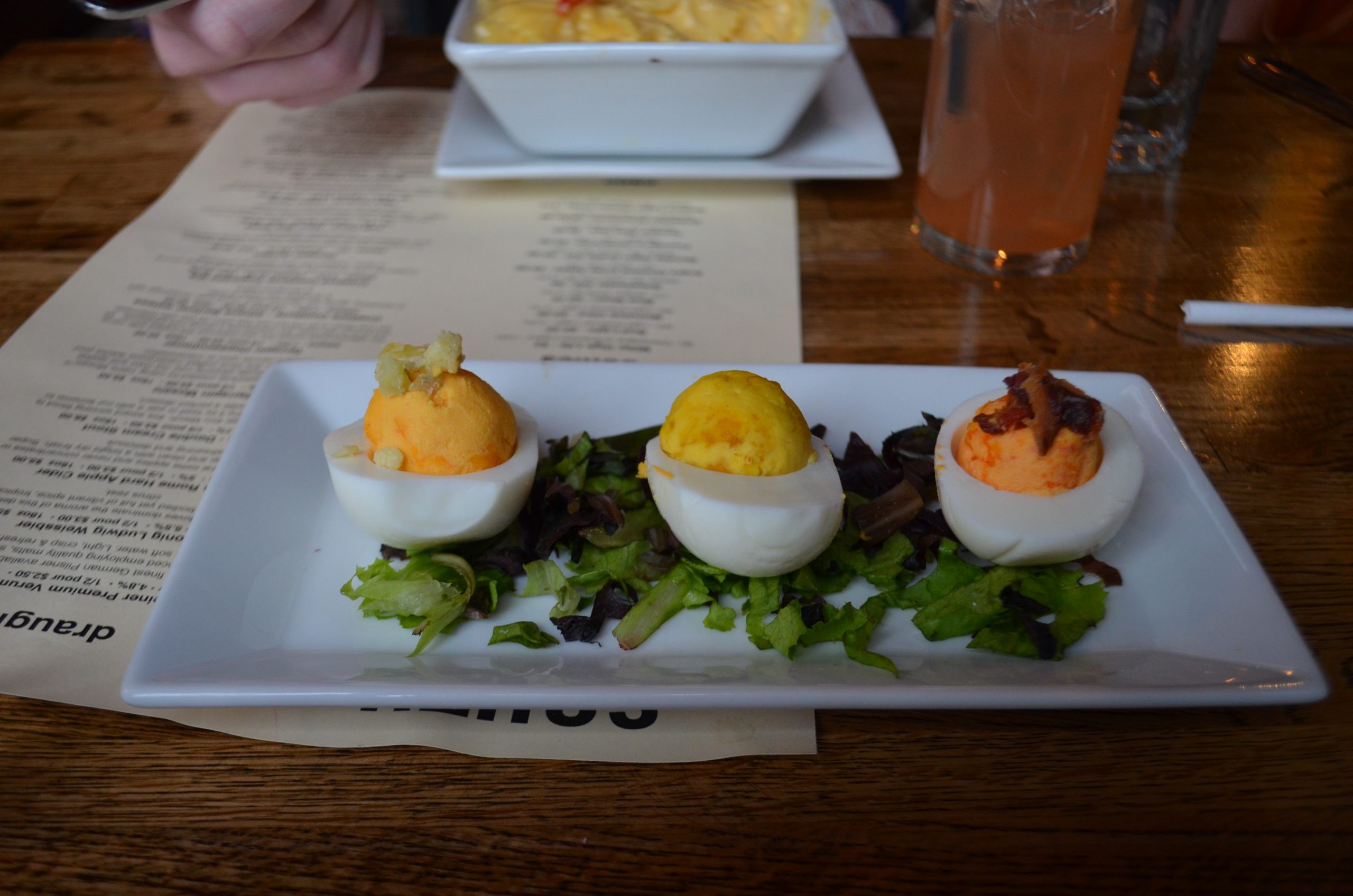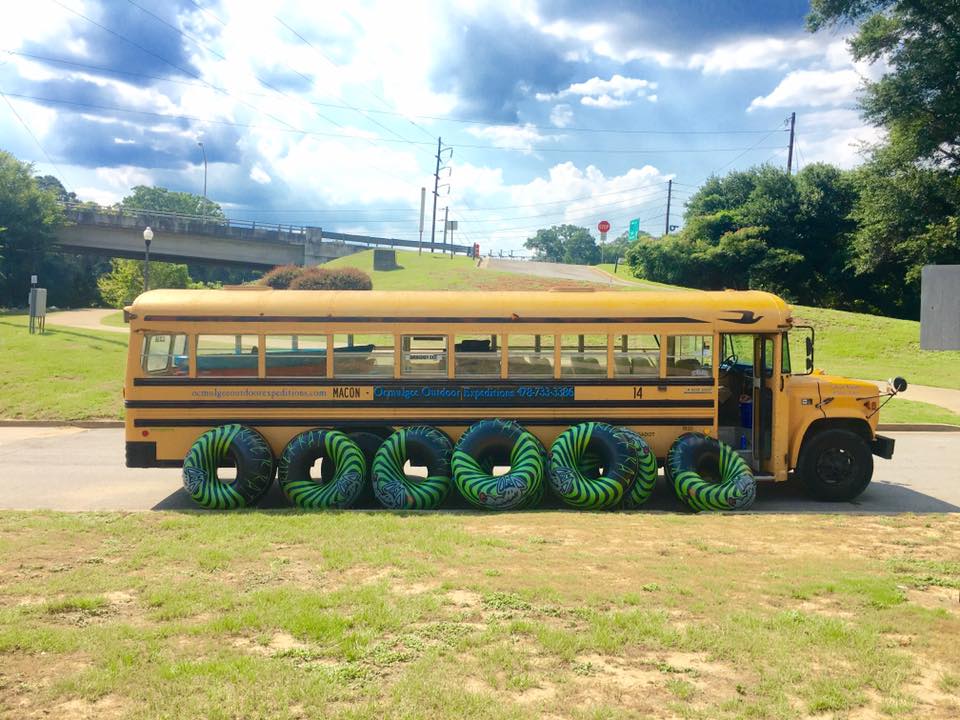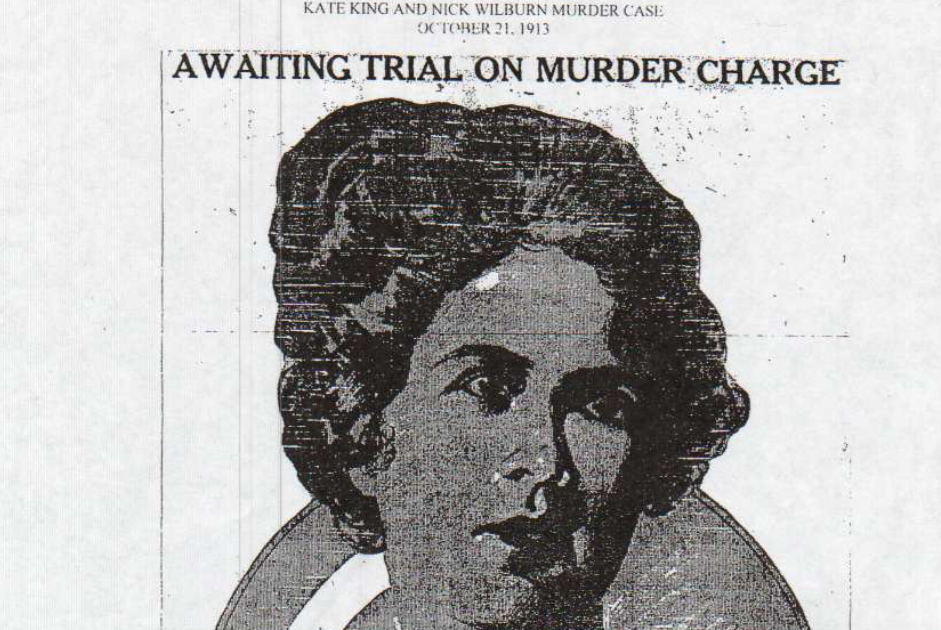Meet Louise Warren: Bragg Jam 2018
I scuffled through the orange football banners, orange admissions uniforms, and orange bear memorabilia of Mercer’s main campus to sit at the orange couches of Jittery Joe’s. A cheerful smile wearing a purple pendant necklace and a purple shirt wrapped me in a hug before discussing her purple album, Lavender Sound. Louise Warren is the singing embrace that sounds like a soothing Hallmark card. Her sentimental songwriting showers listeners with sympathy in “Cherish. “Headed to Nashville” begs for audiences to get well soon. “A Little Bit Yours” greets crowds just because. Through her old soul music style, the youthful Warren revitalizes a fresh face to the Macon music scene. “I’m 27, so I look like a baby. Everyone’s like, ‘I need to see your ID’ when I walk into a bar,” she giggles. Her hands refuse to cover her laughter and instead point at her passions: music, mental health, and Macon.
L: I have always been fiercely determined. Maybe to the degree of annoyance to my parents! They’re like, “Oh, what pursuit are we gonna be dragged through now?” They both have always been super supportive.
C: Yeah, they sound really supportive! I saw a cover photo that’s very nostalgic with you and presumably a family member.
L: Yeah, that’s my father. He was a major influence in my life. He passed away three years ago. The entire [album] is dedicated to him because I went through a super hard time losing him and it was very sudden. And what it does to me, and I imagine other people when you go through something like that, is you kind of wake up and look around you and see, you know, what you’re doing well in your life and what you feel like you wanna do better. And I looked around and I’m like: “I’m putting this off too long. I’m gonna make an album. I’m gonna go and I’m gonna do it. I’m gonna stop saying I’m going to do it, and I’m just gonna go and invest and see where I can make this happen. I had no idea who I’d record with. I had no idea how to record. I had always been performing! But [the] recording aspect was just nothing. I knew nothing about it. So I messaged a friend and we ended up just starting with this entire thing. The catalyst for that was just intense amount of grief and pain and sorrow from losing him, but also wanting him to see that I was still gonna do it. ‘Cause even though he was very practical, he always said like, “You’re life is in your music. Go do your music. Like, that’s what you’re meant to be doing. Like, however we can help you, we will.” Which is a lot for a lawyer who is like, super practical and logical. Like, he believed in me so much and I think that I carry that into this project.
C: Before listening to your project, I saw the album art. I decided that with the shadowed purple hues, the cover is gracefully whimsical.
L: Yeah, that’s totally a description of me. And that’s kind of what we were going for, like we were going for kind of quirky but also very…I use the word “fairy” a lot, in describing the sound and the direction I wanted to go. Like very, like lightning bugs in a forest. Like, my descriptions would be, with both with my producer Sean Williams and the artist who did [the cover art], Casey Trace, were just off-the-charts crazy descriptions, but they managed to pick up what I meant and the core what was I talking about, and produced exactly what I wanted. But I wanted something to feel a little bit magical I wanted it to have a magical tone to it, and I wanted it to feel a little bit ambient and calm, but also have just a shot of espresso in there with some of the songs. But the overall vibe was that I wanted to take people on a journey on it and I wanted them to understand that the journey was like this spirit walk, like this self-transformation.
C: I definitely felt the fairy description. Even the title Lavender Sound suggests a soft, effeminate-like quality.
L: Yeah. It triggers people. They don’t hear the phrase “lavender sound” and not want to understand because it’s not a common one. And I chose it after reading the song “Lavender Sound.” That was how I decided upon that, and the entire idea had been in my head for a while. I just love lavender and it was very calming, and I went through a period of just anxiety and insomnia, and when I was writing the bulk of these early songs for me, I would spray lavender all around my room, put it on my wrists, and just kind of surround myself with it. So then, whenever I would, you know, write a song, it would feel like I was almost trying to do what it sounded like to me. Because the music was as comforting to me, and writing the music was as comforting to me as lavender was to spray and have the scent of. So it was kind of like a self-soothing album. I was soothing myself through this massive growth that young women go through between like your 18 to 21 time period. And we go through so much. We change a lot, and I feel like for me, that I changed more within those years than when I even did in the 5 before, which is unusual, I think. But I just grew up a lot as a person. I started taking more risks, and I started really turning to my craft in a way that I had before, but not as committed. I’ve been writing since I was a kid, just for fun. I’ve always loved songwriting. It’s been my number one. I’d go onto the playground with my classmates and I’d pick the quickest swing I could find, and just swing back and forth and write songs. One of my only friends in second grade I met on a swing set because I didn’t use my time to socialize, I used my time to write. I was super shy and it was sometimes hard for me to make friends because of that, but I managed to figure out a balance. But it was just something that I carried with me my whole life. And I’ve used [songwriting] as therapy, as coffee in the morning, as a number of things to help me make sense of the world around me. It’s how I process.
C: We both agree that lavender is definitely a calming scent, and scents are certainly associated with memories. The line “And when you spoke, it melted my heart to the ground. Your scent left a linger of lavender, and I laid on those purple flowers underneath the tree of you and me.” I’m interpreting this lyric as romantic nostalgia. What memories is “Lavender Sound” reminiscent of?
L: It’s even more than that. It’s nostalgic. It was about a relationship that didn’t work out, but I found the beauty in it, because it drew me closer to who I was meant to be, and I relaxed more in my own skin. And had I not gone through, you know, at the time when I thought was a huge heartbreak or rejection, then I would have never found that person that was there all along. But [I] just needed a nudge to show my strength. I needed the opportunity. So yes, it is totally about romantic nostalgia, but it’s saying that it doesn’t necessarily have to be something that works out for it to be something meaningful and life-changing. And that was certainly the case for me. Because I went through those experiences, I was prepared for when I did find the right person. I was ready for [my fiancé William], and I was like, open-hearted and comfortable in my own skin. And I think that’s hugely important, ‘cause you grow within relationships. You don’t come a full package ready to go and that’s all you ever gonna be. Hopefully not. That to me is worse. I would rather like, learn and throw out all of the cards and see where I can improve. See where I can grow within my friendships, within my romantic relationships, relationships with family, and my relationship with my music, too.
C: That’s incredible. What I also find to be incredible is how your album alternates with the lighthearted breezy sound of “Lavender Sound” and “In the Dark” to the alternative Americana vibe of “This Could Be Love” and “Don’t You Dare.” A darker indie rock vibe is certainly present in the Americana songs.
L: Yeah. “This Could Be Love” came from my utter fascination and complete devotion to a band called Arctic Monkeys.
C: Not even kidding you, Arctic Monkeys is the vibe I got! While I was listening, I was convinced Arctic Monkeys and Ellie King had a baby.
L: Yeah! Yes. And obviously, I wrote [“This Could Be Love”] probably when I was about…17? So I didn’t have Ellie King in my world, but I definitely had Arctic Monkeys at that time and they were my all-time favorite band as a teenager, for sure. And definitely, probably, at least still top three now. I just loved everything about them, but especially their lyrics, and especially how they use more minor chords. But it’s still very upbeat! Even if it’s got like, the minor chords in there and the minor sound to it. So I loved that about their music. I loved that they seemed to combine all [of this] music with like, post-punk, kind of. And I loved it! Seriously, this doesn’t exist right now. It’s good! So that was definitely utter devotion to them. And with “Don’t You Dare,” that was in the middle of the early stages of dating somebody. Absolutely terrified I was going to get my heart broken. I was listening to tons of blues music at the time. And that was my attempt to kind of do a rock-blues sassy mourning to this person.
C: Heartbreak is the absolute worst.
L: Oh my gosh, it’s so hard. It’s that’s the worst. In the moment of going through that, there’s like, such a mixture of anxiety and disappointment and insecurity, and I went through that during this time period. [During] the time period I was going through, I was so let down by life when I wrote the song. I was so let down. And my mom is a very intuitive woman. I’m lucky to have her. She’s fantastic. She looked at me and she’s like, “What’s wrong?” and I just explained to her that I felt [as if] things were not working out, and I just kept on getting into these situations disappointed by life. And she said, “But what do you need right now?” And we end up building a pillow fort in the middle of the living room.
C: You were my age!
L: Yes! We just didn’t care. I built a pillow fort. I watched a Keanu Reeves movie. That comforted me very much. And then I got my guitar out, and I started running this song. And I was able to approach it from place of positivity and calmness and thankfulness. Gratitude. I was thankful that this person had left my life, but had entered it, too, because they had taught me a lot about myself and taught me a lot about what I want in a person, but also I don’t want a person. But even more than that, it was like opening this door to the woman I want to be, and I could not have done that if I didn’t take the risk. And I think that we learn through the risks, because when you’re saying “I want that,” you’re being very authentically yourself. You’re in alignment with who you are, and then if you don’t get that, I feel like that’s the [biggest] show of character. You’ll see where you turn to from there, ‘cause if you don’t get what you want, then you have to be a little bit craftier. You have to like, you know, sit with yourself and be secure in yourself. ‘Cause if nobody else is catching you, you’re all you have. So you learn how to catch yourself. You’re like, “Okay, so I went through something that was hard. And I’m okay. I’m good. Like, that person didn’t want to be in my life that way. Well we learned a lot, we had a lot of fun, we loved a lot, and I can carry that energy with me into the person who does want to be in my life and just like, shower them with love.”
C: Beautiful.
L: That was what comforted me. And I feel like being a songwriter made me see that a lot quicker, or maybe even at all when I wouldn’t have. I feel like [being a songwriter] makes me very self-aware, because I have entire like, life pains and situations staring me back in the face. And if you look [in that] mirror long enough, you’re gonna learn a lot. Like if you study anything for long enough, you’re gonna learn it. So I definitely felt like music gave me that advantage because I would keep going to it, even if it was painful. I would keep looking [in] the mirror and I would keep learning about myself.
C: I definitely hear the learning and self-growth you are talking about in the verse that follows the chorus: “Those days were musky and sweet: a time of growth and blooming.”
L: It’s transformation. Yeah, absolutely it was at the end of that growth period. But it’s still applicable to me, ‘cause even as a 27 year-old woman, I’m constantly learning and constantly growing, and I’m excited by that. The single most exciting thing to me in the world is that I’ll never stop learning. I’m a Ravenclaw, if you can’t tell. Like, that’s very much what I am. I get excited by possibility, and I get excited by opportunity. And in in the world of songwriting, every time you sit down with a guitar, it’s an opportunity.
C: Speaking of opportunities, can you tell me about Rare Gem Creative?
L: Sure. Yeah, that is my coaching practice which I am starting and I just started this year. It’s self-care for creatives, because along my path I’ve learned a whole lot about how to take care of myself and tune in to myself. I’m super into self-improvement and self-help books. And I’ve always, like I said, been very committed to my learning. And as I have moved through my own journey, I have noticed that I’ve benefited from leaning on those things and leaning on my writing and meditation practices, rather than quote-on-quote the “rockstar lifestyle.” That’s not my thing. And I think that a lot of people think that you have to be in pain to be a great artist. That you have to suffer a lot, and that you have to neglect yourself, or not listen to your body when it’s saying: “No, don’t have another drink.” And just kind of throw yourself into it. Like, there’s some sort of idea as a tortured artist that we are better for that, and better artists and creators for that. I think that great art can come out of any emotion, especially a strong one. But I don’t think it has to be that way. I think there’s plenty of strong painful emotions that are out there in the world. We don’t have to create them in ourselves, and as an artist you’re constantly dealing with rejection, so you have to learn how to catch yourself and love yourself and be there for yourself while everybody else around you is telling you “No, that’s never gonna happen. You can’t do that. You can’t do this.” So I wanted to create a coaching practice that was specifically designed for artists, creatives, entrepreneurs. People who are going out there and doing their thing and might need a little bit more self-care than somebody who is kind of dictating what you do each day, and you just show up and you clock-in and you do that. So I really wanted to be able to support them in a different way. Coaching is something that I got in the beginning part of my album creation, and it helped me organize myself entirely. I worked for the creativity coach named Lauren Lapointe. She’s a good friend of mine and just has the best life ever. Like, she’s a yoga teacher, and a writer, and a musician, and she travels everywhere, and also does her coaching. So she worked with me online. We just Skyped and called and that sort of thing. And we laid out the bare bones of what Lavender Sound would be. So she helped me get clear in a time when I was still grieving. So this was like, all during losing my father. Right after everything, I hired a coach and I was like: “Okay. I’m gonna make this happen. It’s really hard right now. I can barely breathe everyday, but I’ll work on this and I’ll have someone holding me accountable so that I can bring this project to life. ‘Cause I have been talking about it since I had written the song. So for about five years I had a lot of ups and downs in this project. I had a record deal offer that didn’t go through because I pulled the plug. It wasn’t the right thing and it wasn’t what I wanted from it. And then after that, I tried to go with another friend of mine who is a producer and engineer, and we could just never get on the same page. But once I found Sean, it was just like, click. Boom. We just have a very similar way of working and we are super similar. We come at music from a place of creativity and fun. Just very laid-back. Seriously, recording felt like going into a living room and sitting down with your guitar and strumming. He would say like, “Where do you want the mic?” and I could literally put it anywhere in the room and just get comfy and get, you know, relaxed. A quote-on-quote “normal” recording studio situation is very much like, “Oh, you’re on the clock. Hurry. Speed it up.” It’s stressful, because you know that if you don’t get it right, you may not have enough money to finish that week, or you have things that you have to do. But with Sean, it was very laid-back. He let us come in and start talking. I wasn’t on the clock the second through the door. He was just very loving and giving of himself as a producer and engineer, and pretty much did everything on the album except for that one drum part on “Haunted.” And my guitarist and my vocals. So, the guy is a genius. He is a genius.
C: Sean sounds like someone who understands and doesn’t force you to be a tortured artist.
L: No. We’re anti-that. Neither of us, really, are into self-destructive habits. We’re all about improving and growth and creativity and just having fun with it.
C: What a healthy approach to music!
L: I think so too, and it’s way easier than letting yourself slide back into depression and anxiety and act on that emotion and act from that place. Because I think the first thing you’re gonna reach for when you’re in those places is not necessarily something healthy. So I trained myself to reach for my guitar. And I trained myself to reach for my journal. And I trained myself to reach for, like a cup of tea and some meditation. And it makes a huge difference, ‘cause then you’ll have the self-awareness and you’ll have, like, all of these insights come to you. Like, “Oh. Okay, well maybe I can do this. Or I can do that. Or maybe, my mind just needs a break for now, and I’ll just go watch a ton of Netflix, and it’ll be awesome. Like, you tune back into yourself and your life.
C: I feel like you have a very strong sense of self, you know?
L: It’s hard-earned. Hard-earned…We’re just moving through life now in a different way. So we’re not in the same place with what is expected of us. We’re not in the same energy around us, too. But you still have that person inside of you. Always. And I know that to be true about myself. There’s like, this memory that I have of just kind of cutting loose and dancing with my mom at the Native American Festival that they have here [in Macon]. And I was about three years old, and I think one of my truest most authentic memories of who I am as a person was when my mom got up with me and we just danced. ‘Cause [the Native Americans] have the drum part where they call everybody around and like, invite everybody to dance. And I remember just the joy of the beat, the joy of the music and people singing, and the joy of being somebody who would just kind of let themselves go in that way. And I just reference that all the time in my life. When I’m searching for myself, I usually go to that memory. I’m like, “Well that’s me. I have a love of music, I have a love of life, and I have a love of people that I wanna share.
C: Love, love, love! You have a lovable personality. Have you ever looked into spreading the love by working with organizations that encourage mental health awareness?
L: I feel like you [have a lovable personality]! This is like, the most laid-back fun interview ever. I would definitely love to do more of [mental health advocacy]. I would love to raise awareness about mental health issues. I know a lot of people who have suffered depression. I myself have suffered [from] depression and anxiety, sometimes at the same time. And I was lucky enough to have the outlet of music and the self-awareness and the understanding of where my resources were to work myself out of it. Not everybody knows that they have those things accessible or how to use them or how to do that. They haven’t tapped into that part of themselves, so they struggle through it a lot more. And I would love to alleviate as much of that as humanly possible. You can’t take somebody who’s depressed into like, ecstatic joy. You can’t do that, but you can maybe take them from depressed to neutral, or you can take them from depressed to a place where they can even let out one smile that day. And I would love to be the center of that. Especially for music.
C: Music is a precious therapy for you.
L: It’s absolutely healing. Whether it is a sad song or a happy song, you know, music does so much to our minds. It does so much to our brains. You know, why would you not be careful? I’m careful about what I eat, and it has a chemical effect on my body. So I’m gonna be careful about what music I listen to, because it also has a chemical effect on my body. And if I’m feeling like a song is bringing me down or saying something that I don’t resonate with, then I keep on moving. And if somebody feels that way about my song, go find a song that makes you feel good. Like, I don’t want you to [feel bad]. That’s not something that I care about. I want you that space for everybody to find something that’s joyous for them. Like even at the hospital if I’m playing a song and I can tell they’re not [liking] it at all.
C: Really? There are people like that?
L: Okay, this is the best story ever. I had this one kid who was just absolutely not into it. I played some Katy Perry “Firework.” I was like, “This is inspirational. We’re gonna like, crack in with these high notes or something. Like, we’re gonna go to town. This kid was like, “It wasn’t even that good” and just looked at me like that. I’m not even kidding! And I didn’t take it personally, like I understand the situation. I understand like, he didn’t really want me in there to begin with. But then I was like, “Okay. Well then, can I try one more?” And it was a few years back, and I whipped out “What Does the Fox Say?” I did not make it to the chorus before he was smiling, and I had won him over. And I has left the room I was just like [smiles]. ‘Cause that’s the goal. I go in there with the goal to make them happy. It’s not about me. It’s not about what they think of me. It’s not about what they’re feeling of me. It’s not about my wrong note, or my right note, or whatever I’m doing. It’s not ego. It’s about them. So I try to do that, which was hard in the beginning, ‘cause I was trained as a performer to like, watch the audience and stuff. Like, I was just trained to see it from that perspective, but when you’re doing it in a capacity of volunteering for kids, it’s not about you. Your ego has to be completely removed from it.
C: Yes, you sing at The Children’s Hospital. Because you were born in Macon, I’m sure that you’ve definitely performed all around town. As an artist, describe growing up in Macon.
L: The first thing is that it made watching other people’s shows and getting into my music easier, because there have been a lot, especially lately, there’ve been a lot more bigger acts touring. But also discovering people like Sean who I can work with, and his family and learning from them, I was able to pick up some skills a lot quicker than I would have been if I had been in a more isolated town that didn’t have a music scene. But the number one way is it gave me opportunity to play gigs like at Taste and See or play gigs at like, The Hummingbird. To play gigs there and get my feet wet in an environment that wasn’t as intimidating as Atlanta. So I was able to reach out and have, I mean, I can think of five different places right now I can play, because of the fact that we have so many options here! So that’s the cool thing is growing up here, you’re exposed to musicians that are, you know, better than you that you can learn from and grow from, and who are very supportive and want you to succeed. And you have a lot of options. Now, we have The Creek coming. We have The 11th Hour. We have all these things that just give us the ability to tap into the scene and be seen and heard and have an active audience here. And that’s incredible to me. And I think that when I was younger, I didn’t fully appreciate it until traveling to some smaller towns and seeing how small their scene was, and how much they didn’t have the option of where they go to play. Like for instance, Warner Robins doesn’t have a lot of options. So you can’t just, you know, pick two or three different coffee shops and book a gig there. You can’t do that. I used to work at Wellston Station right before it recently closed. And I mean, I don’t know where all those people are going to play now, because that was one of the primarily acoustic venues that was family-friendly. You’re not having to go into some dodgy bar and sit there covered in cigarette smoke the entire duration of your performance, which is hard to sing in, you know. It dries out your voice, so it’s hard to sing in [that] environment. So I’ve been really lucky growing up here, because it made it easier. And you know, my parents couldn’t like, afford to take me to Atlanta every single weekend to travel or train or do other things, so had I not had such culture and arts here, it would’ve been really hard for me to get better. But we do, so I’m incredibly lucky.
C: Yeah, we are lucky! Macon has such a community-type vibe, which I love.
L: And I think it’s gaining that even further. I mean, opportunities are always going to come and go and good things in Macon are always going to come and go, but the heart of it are a group of community-minded people who wanna make it the best it can be.
C: Yeah, especially with community-minded artists like you! Is there a special place you enjoy performing at alongside The Children’s Hospital?
L: Thank you! Anytime I do Bragg Jam at Taste and See is always a really fun. Taste and See is such a comfortable environment for me. I really have come to just love the energy. I thrive in coffee shops, because I feel like people listen a little bit differently.
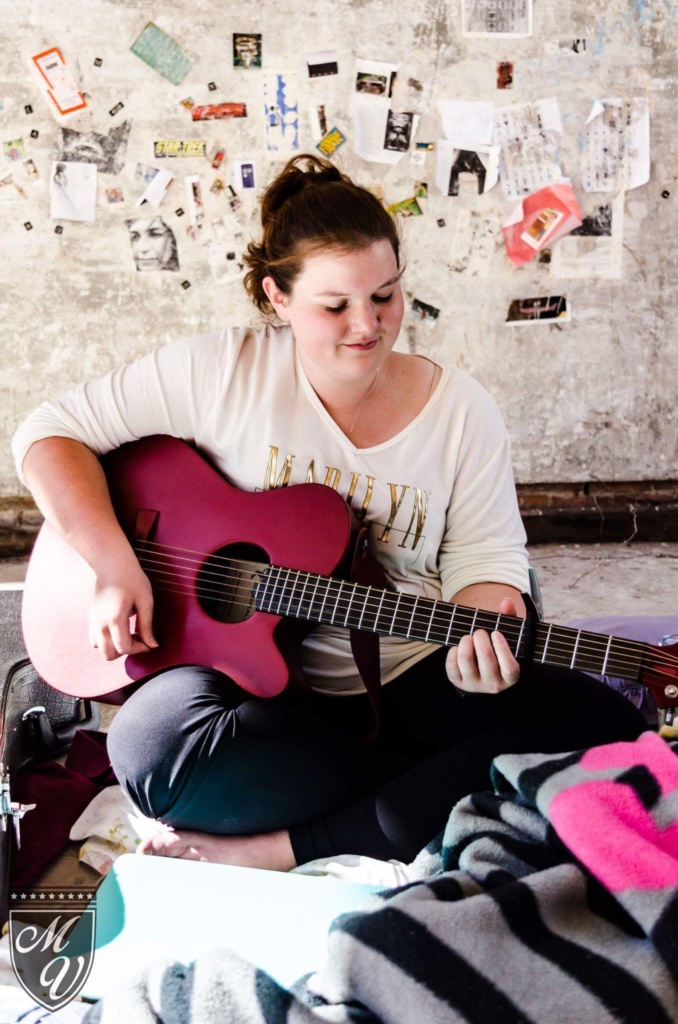
C: We’re in one now!
L: Yeah! And I always love playing at The Cox. Like, when I get to open for people at The Cox, that’s such a good moment for me. Just being on the stage. When you’re on that elevated stage and you have lights and you can just feel the energy in the room, that builds a performance. Like, I feed off of that energy and that give and take and back and forth. So I love doing that, too. It’s so much fun.
C: That’s awesome. How was last year’s Bragg Jam?
L: It was fantastic! I [performed] at Taste and See, and I played a lot of my stuff from the album. And it was so much fun because [it was] the first time I had done Bragg Jam after having released it, and I had a few people in the crowd who were actually singing along. And it was an unusual happy sensation, ‘cause I look and I’m like, “Oh my gosh, they know every word! Like, how do you know every word?” And [they’d] say like, “I totally downloaded it.”
Warren’s lips curve into an endearing smile as we sit at the couches of her coffee shop comfort zone. The young Arctic Monkeys fan and Rare Gem Creative founder reveals her old soul with fragrant songwriting and sounds. Like the age of her spirit, the singer’s passions have no boundaries. Her Hallmark hug goodbye to me sounds like the album she is promoting: “a little bit ambient and calm, but also [with] just a shot of espresso.” Download Warren’s purple album Lavender Sound to sing along this weekend at Bragg Jam. We’ll sing with you this Saturday, June 27 from 4:30-5:30 p.m. at 11th Hour Stage at Gallery West!
Sunny in the southern sunshine,
Cat
